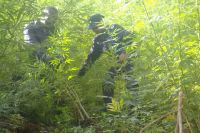
MBABANE –Swaziland has been cited as one of two countries that grow dagga for the Southern African market.
The other country linked to the dagga growing is ironically another kingdom, Lesotho. The shocking revelation was made by the South African Ceantral Drug Authority National Co-ordinator Johan Kruger.
Speaking to South African media, Kruger said; “Swaziland and Lesotho are the countries that grow cannabis for South Africa. The region has actually been dubbed a net exporter of cannabis to other countries and there is also a danger that the 2010 World Cup will worsen drug trafficking”, said Kruger
Police PRO Vusi Masuku confirmed that they cannot rule out that possibility.
“We have had instances where the army has captured people smuggling dagga out of the country to neighboring South Africa,” said Masuku.
“Locals and other nationals have also been arrested for trying to smuggle large quantities of dagga. The anti-drug unit has been engaged in a vigorous campaign that is aimed at eradicating dagga. The unit has conducted raids often in a number of forests across the regions and found dagga plants which they subsequently destroyed,” added Masuku.
South African Deputy Chairman of the Central Drug Authority David Bayever said, “Cannabis use was three times the global average in South Africa. Drugs and substance abuse problems were the underlying causes of ills such as HIV/AIDS, violence and crime. Our youth are going to be on holiday and they are going to be targeted. During the tournament law enforcement and customs officials will be under pressure due to massive tourist inflows. We need to handle substance abuse”.
In the past couple of months, local police have confirmed to have destroyed large hectares of dagga worth millions of Emalangeni in street value.
“The latest dagga destroyed was worth a street value of E7.2million which was found in Ndzingeni, Mabhindzi and Mgungundlovu. In previous years we have worked hand-in-hand with our South African counterparts in destroying various large fields of dagga using helicopters and spraying chemicals,” said Masuku.
With South Africa hosting the biggest sporting event globally in three months time, the country is on high alert where drug trafficking and any other criminal offences that are bound to paint a negative image are concerned.




